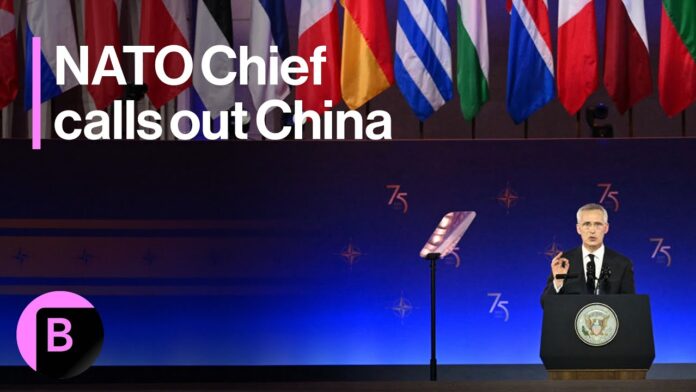NATO issues stern rebuke, labelling China as a significant supporter of Moscow’s actions amid growing global tensions
In a decisive statement reflecting escalating geopolitical tensions, NATO leaders have formally denounced China as a “decisive enabler” of Russia’s ongoing conflict with Ukraine. The alliance’s communique, approved during a summit in Washington attended by all 32 NATO members, marks a significant escalation in rhetoric against Beijing.
NATO Secretary General Jens Stoltenberg emphasized the gravity of the alliance’s message, describing it as a clear indictment of China’s role in supporting Russia’s military efforts. “The message sent from NATO is very strong and very clear. We are unequivocally attributing responsibility to China for enabling Russia’s war,” Stoltenberg declared, underscoring the statement’s importance.
The communique explicitly calls on China to halt all forms of support—both material and political—towards Russia’s defence sector. NATO leaders accuse Beijing of facilitating Russia’s military capabilities through the transfer of dual-use materials crucial for Russia’s defence industry, including weapons components and raw materials.
While Beijing denies providing direct military aid to Moscow, it maintains substantial economic ties with Russia throughout the conflict. China’s response to NATO’s accusations has been assertive, with its foreign ministry criticizing NATO’s increasing involvement in the Asia-Pacific region and denouncing what it perceives as Cold War rhetoric and unfounded accusations.
Simultaneously, NATO’s statement coincides with summit discussions involving leaders from Australia, Japan, New Zealand, and South Korea, underscoring growing global concerns over Beijing’s expanding influence and its strategic alignments.
The communique also highlights NATO’s apprehensions regarding China’s cyber and hybrid warfare activities, accusing Beijing of sustained malicious actions, including disinformation campaigns. Additionally, NATO raises alarms over China’s rapid nuclear arsenal expansion, noting increased warhead capabilities and sophisticated delivery systems.
Danny Russel, a former US assistant secretary of state for Asia, characterized NATO’s stance as unprecedented, emphasizing the failure of Beijing’s attempts to balance relations between Russia and Western Europe. Russel noted that instead of dividing alliances, China’s policies have fostered greater solidarity among key nations across the Euro-Atlantic and Asia-Pacific regions.
Recent joint military drills between Chinese troops and Belarus have further underscored regional tensions. NATO members like Poland, wary of these developments, view such exercises as potential tools for disinformation and propaganda, given Belarus’s alignment with Russia and Poland’s NATO membership supporting Kyiv.
Analysis:
Political Perspective: NATO’s declaration against China marks a strategic shift, reflecting heightened concerns over Beijing’s global influence and its alignment with Russia amidst ongoing conflicts. This move signals NATO’s efforts to consolidate Western alliances against perceived threats from Moscow and Beijing, shaping future geopolitical strategies.
Social Perspective: The NATO-China tension highlights broader societal anxieties regarding global power dynamics and the implications of major power alignments on international stability. It underscores debates over sovereignty, alliance solidarity, and the role of economic interdependence in shaping geopolitical outcomes.
Economic Perspective: While indirect, NATO’s stance against China could impact global economic relations, particularly in defence and technology sectors. Heightened scrutiny over dual-use exports and cyber activities may influence trade policies and international investment decisions, contributing to economic uncertainties.
